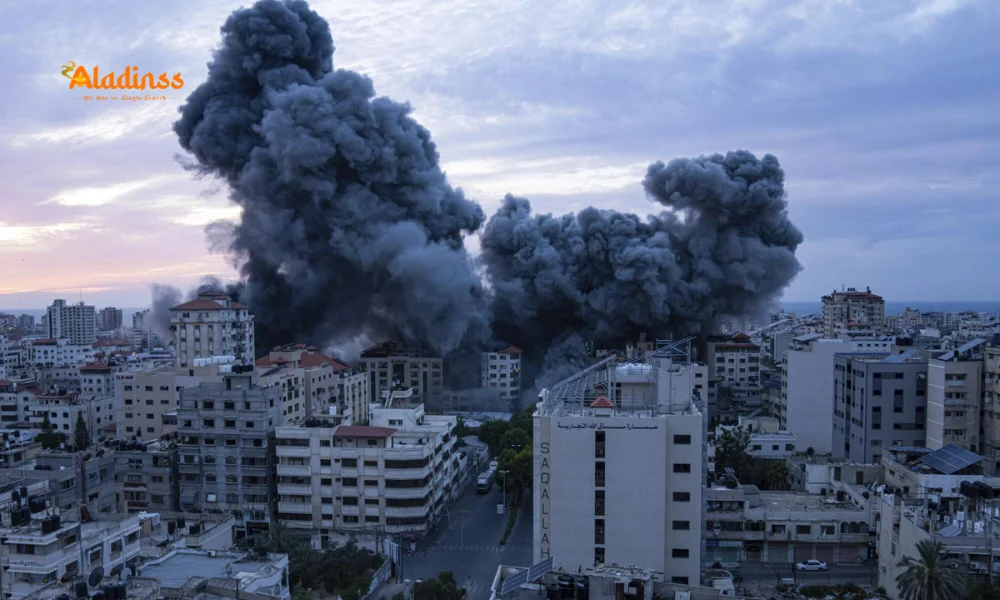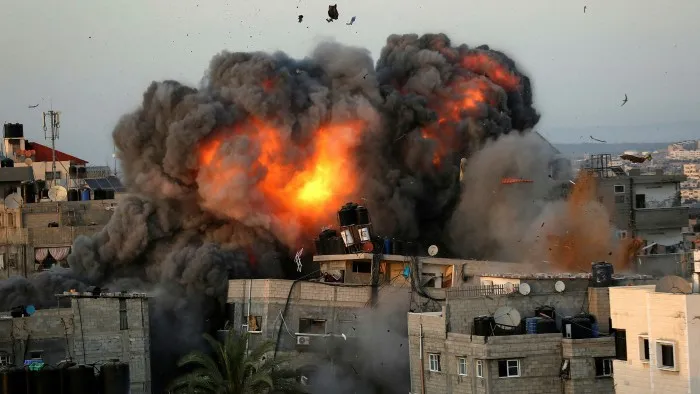Israeli Attack Intensifies: Mass Exodus from Gaza

Israeli Attack Intensifies: Mass Exodus from Gaza Amid Ground Offensive
The Israeli military has significantly escalated its ground offensive in Gaza, prompting a large-scale evacuation of civilians from the region. The intensified operations, which began in early September 2025, follow a prolonged conflict sparked by the October 7, 2023, Hamas attack on Israel, where over 1,200 people were killed and more than 250 hostages were taken. In response, Israel has conducted extensive airstrikes and ground operations targeting Hamas infrastructure in Gaza, resulting in over 65,000 Palestinian deaths, according to Gaza’s Health Ministry, with significant civilian casualties.
Eyewitnesses report relentless airstrikes and artillery fire that have reduced entire neighborhoods to rubble. Families are fleeing Gaza City, carrying what little they can as they head toward designated humanitarian zones in the south. The Israeli Defense Forces (IDF) have issued evacuation orders for over 1.2 million residents, citing the need to protect civilians from the intensifying conflict. However, humanitarian organizations warn that these zones lack adequate resources, with shortages of food, clean water, and medical supplies creating dire conditions for displaced people.

Humanitarian Crisis Deepens in Gaza
The mass exodus from Gaza City has overwhelmed aid agencies struggling to provide basic necessities. Over 300,000 people have reportedly left the city in the past week, with many seeking refuge in overcrowded shelters or temporary camps. The United Nations Relief and Works Agency (UNRWA) has described the situation as a "catastrophic humanitarian crisis," with hospitals operating at capacity and reports of widespread hunger. The destruction of critical infrastructure, including water treatment plants and power grids, has left much of Gaza without electricity or clean water, exacerbating the plight of civilians.
International aid groups have called for an immediate ceasefire to allow for the safe delivery of humanitarian supplies. However, the Israeli military maintains that its operations are necessary to dismantle Hamas’s military capabilities, including underground tunnels and weapon stockpiles. The IDF claims to have targeted over 3,000 Hamas sites since the conflict began, though civilian casualties have sparked global outcry and demands for accountability.
Global Response and Palestine Recognition
Amid the escalating violence, the international community has taken significant steps toward recognizing Palestine as a sovereign state. Canada, England, and Australia officially recognized Palestine in early 2025, a move that has drawn both praise and criticism. At the United Nations General Assembly meeting scheduled for September 23, 2025, France and several other nations are expected to announce their recognition of Palestine, further shifting the diplomatic landscape. These decisions reflect growing global support for Palestinian self-determination, though they have also strained relations with Israel.
The recognition of Palestine comes at a critical juncture, as the humanitarian toll of the conflict continues to mount. Protests have erupted in major cities worldwide, with demonstrators calling for an end to the violence and increased aid to Gaza. Meanwhile, diplomatic efforts to broker a ceasefire have so far failed, with both sides accusing each other of violating previous agreements. The UN Security Council is set to hold an emergency session to address the crisis, though analysts remain skeptical about the prospects for a resolution.
Impact on Civilians and Infrastructure
The intensified Israeli offensive has left Gaza’s infrastructure in tatters. Satellite imagery shows widespread destruction, with residential buildings, schools, and hospitals reduced to rubble. The Gaza Health Ministry reports that over 70% of the region’s hospitals are either damaged or non-functional, leaving thousands without access to critical medical care. The lack of electricity has also crippled water treatment facilities, leading to a severe shortage of clean drinking water.
For those fleeing Gaza City, the journey south is fraught with danger. Roads are congested, and reports of airstrikes targeting evacuation routes have raised concerns about the safety of civilians. Many families are separated in the chaos, with parents searching desperately for missing children. Aid workers on the ground describe scenes of panic and despair, as people struggle to find safety amid the relentless bombardment.
The Broader Geopolitical Context
The current escalation in Gaza is part of a broader geopolitical struggle in the Middle East. The October 2023 Hamas attack, which caught Israel off guard, has reshaped the region’s dynamics, with increased tensions between Israel and its neighbors. Iran, accused of supporting Hamas, has faced international sanctions, while Hezbollah in Lebanon has also engaged in cross-border skirmishes with Israeli forces. These developments have raised fears of a wider regional conflict, with global powers urging restraint.
The recognition of Palestine by several Western nations has further complicated the situation. While supporters argue that it strengthens the case for a two-state solution, critics, including Israeli officials, claim it rewards Hamas’s actions. The UN General Assembly’s upcoming discussions are expected to focus on the humanitarian crisis and the potential for a lasting peace agreement, though deep divisions among member states make consensus unlikely.
What Lies Ahead for Gaza
As the Israeli offensive continues, the future for Gaza’s 2.3 million residents remains uncertain. The displacement of hundreds of thousands of people has created one of the largest humanitarian crises in recent history, with no immediate end in sight. International organizations are calling for increased funding to support relief efforts, but logistical challenges and ongoing fighting make aid delivery nearly impossible in many areas.
The global spotlight on Gaza has also intensified scrutiny of both Israeli and Hamas actions. Human rights groups have accused both sides of violating international law, with reports of indiscriminate attacks on civilian areas. The International Criminal Court (ICC) is reportedly considering investigations into alleged war crimes, though both Israel and Hamas have rejected the court’s jurisdiction.
For now, the people of Gaza face an uncertain future, caught between the violence of war and the hope for a peaceful resolution. As world leaders gather at the UN General Assembly, the international community faces mounting pressure to address the crisis and work toward a sustainable solution that ensures the safety and dignity of all involved.
Comment / Reply From
No comments yet. Be the first to comment!








